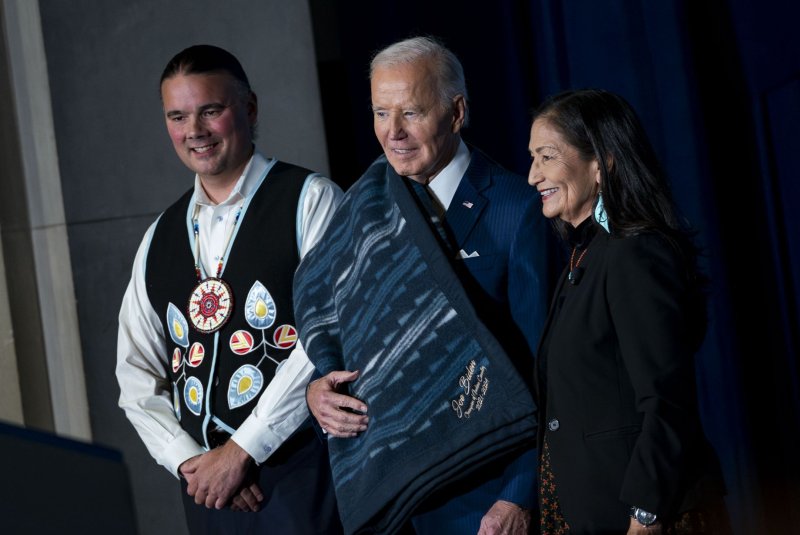Dec. 9 (UPI) — President Joe Biden appeared Monday at his fourth and final Tribal Nations Summit in Washington, where he announced the establishment of the Carlisle Federal Indian Boarding School National Monument in Carlisle, Penn.
In introducing the president, U.S. Interior Secretary Deb Haaland praised Biden’s leadership on myriad issues important to American Indians, calling him the “best president for Indian country in my lifetime.” She then presented the president with a tribal blanket embroidered with “Joe Biden, Champion of Indian Country 2021-2024.”
“You know, it’s the honor of my life to be a partner of the tribes throughout my presidency,” Biden said. “I’m gonna cherish this moment.”
The outgoing president reaffirmed his administration’s “historic” progress to strengthen the “Nation-to-Nation relationships with Tribal Nations and cementing its legacy as one of the most supportive administrations for tribes ever,” as announced by the White House in an earlier release.
The Cumberland County monument will, according to the White House, tell the story of “oppression endured by thousands of Native children and their families at this site and the harmful legacy of the broader Indian boarding school system that the federal government operated or supported across the country for more than 150 years.”
It’s located on a little more than 24 acres of what is now the U.S. Army’s Carlisle Barracks at one of the nation’s oldest military installations. The U.S. Army will transfer administrative jurisdiction over its storied gateposts to the National Park Service. The new monument will be managed jointly by the Army and National Park Service.
According to officials, the boundary will encompass historic buildings and structures that make up the Carlisle School’s campus.
The Tribal Nations Summit, established by executive order, is now the annual convening of the federal government and America’s tribal nations.
The summit brings together the current president, Cabinet officials and agency-level officials together in order to reinforce “the fundamental principles of tribal sovereignty, tribal self-determination, and the federal governments trust responsibility, in order that native nations and native peoples thrive, prosper and retain their reserved rights,” according to the U.S. government.
Also on Monday, the U.S. Department of Housing and Urban Development announced that more than $72 million will be given to 38 tribal communities through its Indian Community Development Block Grant program to be used for a number of critical investments such as infrastructure, community buildings, housing, land acquisition and economic development to support native American and Alaskan families on reservations.
Meanwhile, the White House highlighted its “respect” and the outgoing Biden administration’s effort to aid American tribal nations, adding that Monday’s action builds on Biden’s “historic” recent apology to afflicted tribal nations.
In October, the incumbent Democratic president issued an official presidential apology to the Native American population for the numerous harms caused by the U.S. government’s atrocities to American tribes during the federal Indian boarding school era from roughly 1819 to the mid-1970s.
The Biden administration says this new action builds on that. The Pennsylvania location also is expected to lead research and listening sessions with tribes and native communities across the United States as part of the Federal Indian Boarding School Initiative.
However, scores of activists, actors and lawmakers have been calling on Biden to grant clemency to jailed native American activist Leonard Peltier as a necessity for healing the long-standing generational wounds between the U.S. government and its indigenous populations.
Amnesty International has long-since called for presidential intervention for Peltier doing so as recently as October on Indigenous Peoples’ Day — the former “Columbus Day.”
“As President Biden considers candidates for clemency in the final weeks of his term, the Native American activist Leonard Peltier is among those who deserve that grace and mercy,” Sen. Ben Schatz, D-Hawaii, chair of the Senate’s Indian Affairs Committee, said last week on the Senate floor.







